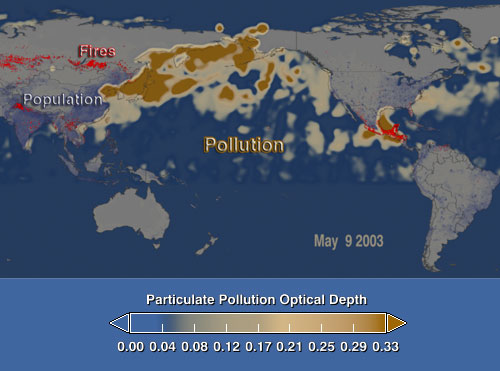Air Pollution Is Global

Unlike charity air pollution doesn’t necessarily begin at home:
WASHINGTON — From 500 miles in space, satellites track brown clouds of dust, soot and other toxic pollutants from China and elsewhere in Asia as they stream across the Pacific and take dead aim at the western U.S.
A fleet of tiny, specially equipped unmanned aerial vehicles, launched from an island in the East China Sea 700 or so miles downwind of Beijing , are flying through the projected paths of the pollution taking chemical samples and recording temperatures, humidity levels and sunlight intensity in the clouds of smog.
On the summit of 9,000-foot Mt. Bachelor in central Oregon and near sea level at Cheeka Peak on Washington state’s Olympic Peninsula , monitors track the pollution as it arrives in America.
By some estimates more than 10 billion pounds of airborne pollutants from Asia — ranging from soot to mercury to carbon dioxide to ozone — reach the U.S. annually. The problem is only expected to worsen: Some Chinese officials have warned that pollution in their country could quadruple in the next 15 years.
Over the period of the last 20 years the U. S. and Europe have achieved much of the gains they’ve seen in reduced air pollution, water pollution, and energy use by in effect exporting their industry to China. As you can see from the picture at right from NASA, the air pollution is coming right back to us. It’s an old graphic but illustrates the problem nicely. The situation has not improved since 2003. Unfortunately, since the sources are mostly in south-eastern China, they’re a lot harder for us to manage than they would be if they were here or in Europe.
Nonetheless the pollution solution is clear: evaluate the costs of the negative externalities that the airbourne pollution represents and impose a tax in that amount on the polluters or, if treaties we’ve agreed to prevent that, on the importers who deal with the polluters.
That’s not anti-trade nor anti-globalization nor even anti-Chinese. It’s merely dealing prudently with the problems at hand.

Psssst over here… Your images don’t show up correctly in the latest version of Firefox.
Wow, common sense.
That, and government regulation cutting automobile pollution and so on…
This is why it makes little sense to allow free trade with counties having weaker regulations than ours. Either we should drop our own regulations, or impose tariffs to even the score. The current system just puts us at a disadvantage.
jeff, China actually has stronger regulations than ours. The problem isn’t laws it’s the civic infrastructure necessary to enforce laws—everything from the relationship between industry and the government to an independent judiciary and tradition of civil law.
I don’t disagree, but it is the de facto regime which matters, not some papers on file in Beijing.
I would be interested in doucmentation that supports the claim “China actually has stronger regulations than ours.” That is a rather large claim made about a vastly complex subject,
http://globalisation-and-the-environment.blogspot.com/2007/05/environmental-regulations-in-china.html
Wen Jiabao, China’s premier, has delivered a scathing assessment of his government’s inability to meet long-stated goals to cut pollution and energy use, saying this must be corrected to sustain growth.
“China must take responsibility for reducing polluting emissions,” he said. China remains steadfastly opposed, however, to mandatory cuts in emissions.
Air pollution is a global problem.The main cause of air pollution is harmful gaseous coming out of industries.
————–
marry
Blazeinfotech